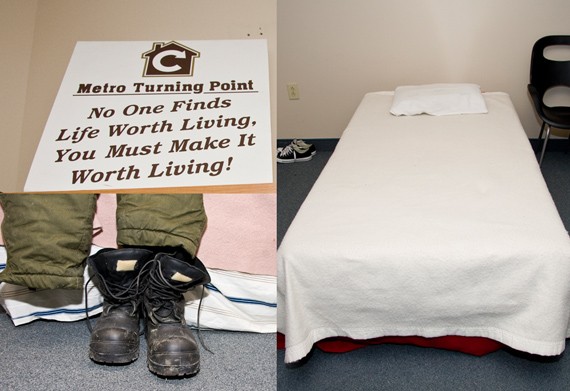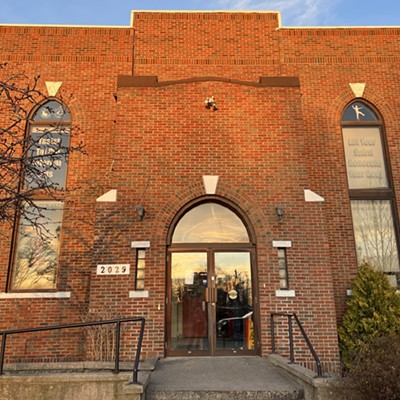One size doesn't fit all. They tried to tell us so. After their warnings fell on deaf ears, this coalition of do-gooders now known as the Out of the Cold shelter organizing committee switched tactics. They combined their considerable resources and contacts and started working to create a new homeless shelter—-one that would fit the people that didn't fit anywhere else.
Slowly, these representatives from community organizations, churches and advocacy groups have been changing people's minds, and gathering supporters, but they still need one thing: a place to concentrate their collected energy on. They need a space.
For four months, Halifax has been trying to fit its homeless into a single system, but there are many for whom the system has shrunk too small.
One person who didn't fit was Alicia Connor. She is a trans woman, so the feeling was not new, but when she decided to flee her abusive neighbours, she became homeless. Not fitting suddenly meant a night on the street, or worse.
She went to the two shelters for women in the city. At Adsum House, she felt that the residents were suspicious of her.
"I didn't want to make anyone uncomfortable. That wasn't my intention."
She left. At Barry House, the last-resort shelter for women in the city, she did not feel welcome.
"Because of who I am, they were trying to push me out," she says. After a week, the staff expected her to have found an apartment, and to leave.
"I didn't want to live in a shelter, but when they're trying to push you out, it is putting more pressure on you. You get confused, and frustrated, and it becomes more difficult to cope with everything else."
The Out of the Cold Shelter organizing committee knew what was happening to Alicia: They knew about her in November, when she was on the street, and since then they learned about many others who aren't being served by the system since the loss of Pendleton Place, the emergency shelter the province refused to fund in October.
The committee has been working since then, without funding from any level of government, to fill the gap left by Pendleton's closure.
Fiona Traynor works for Dalhousie Legal Aid and is a member of the committee. She says the roadblocks that they have faced are evidence that there is still a lack of understanding about the unaddressed issues of a segment of the homeless population.
The Out of the Cold shelter, projected to have only 12 beds, would target that tiny segment.
In January, they thought they had found a place for the shelter at the First Congregational church on Seldon Street. Senior pastor Douglas Mott was willing to open the church up during the nights to let people in to sleep, and the committee was ready to train volunteers to staff the overnight shifts. The committee called a meeting on January 29 to see how many interested volunteers they could find.
"The response was amazing," Traynor says. "There were more than 100 people there."
"The minister, at the end of the meeting, came over to us and said 'We feel very blessed that we are able to help you with this.'"
But the euphoria was short-lived. Twelve residents from the neighbourhood attended the meeting to tell the committee their vision didn't fit on Seldon Street, either. They interrupted the volunteer meeting to say that they did not want a wet homeless shelter in their neighbourhood. When asked about it later, four members of the neighbourhood delegation declined to comment.
They did, however, contact their councillor, Sue Uteck.
"I heard from everyone on the street," she says. "Their concern was that they weren't notified. (The committee) went about the process all wrong."
The day after the interrupted volunteer meeting, a senior city planner called the committee.
"The HRM came down hard and fast and told us that it wasn't going to happen." Traynor says.
The reason: The First Congregational Church isn't zoned properly to house a shelter. Seldon Street is a residential zone.
Desirée MacNeil, a Dalhousie student, was at the meeting. She says the community delegation "was a bunch of people only worried about their real estate values. It was so frustrating."
MacNeil attended the meeting because she made a commitment a year ago to get involved in homelessness issues in Halifax. As part of a school project, she spent a night on the street with nothing but a sleeping bag.
"I felt like I wasn't in Canada anymore. People didn't know how to look at me, and that really bothered me."
The experience convinced her that homelessness was a problem that could be fixed in Canada. On February 11, MacNeil started a group called Students for the Streets. She wants to help other students volunteer at places that serve homeless people in the city, like drop-in centres and meal services. And shelters.
Traynor says 80 people took volunteer applications after the meeting at First Congregational, and nearly 50 are now going through training. Several members of Students for the Streets are attending the training sessions, although MacNeil isn't.
The Metro Non-Profit Housing Association (MNPHA) will be in charge of the administration of the Out of the Cold Shelter, bottom-lining the volunteers and donations. Carol Charlebois is the executive director of MNPHA, and the person negotiating possible locations for the shelter.
She says the search has been narrowed down to two spots, and they will know by the end of the week. They hope to open the shelter's doors March 1, and keep it open until the end of April.
In May, they hope to bring in even more opinions and voices from the community to evaluate the whole process.
"We can't have this kind of emergency every winter," she says.

















